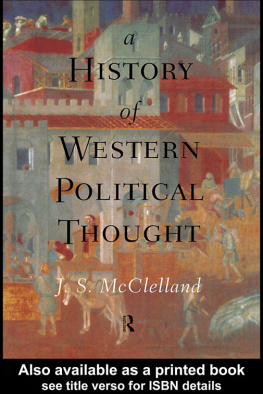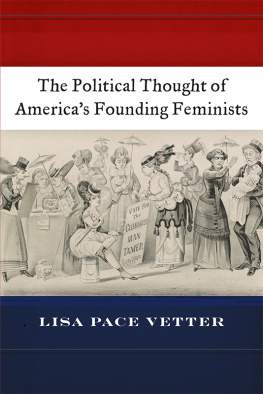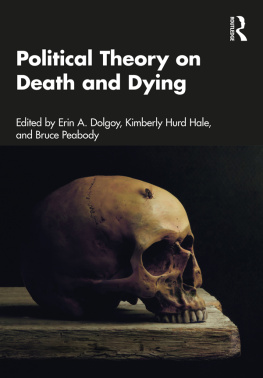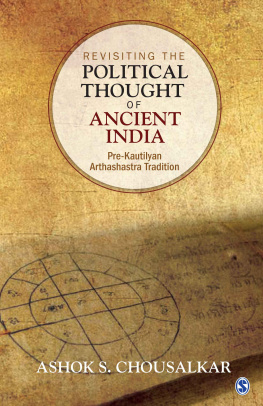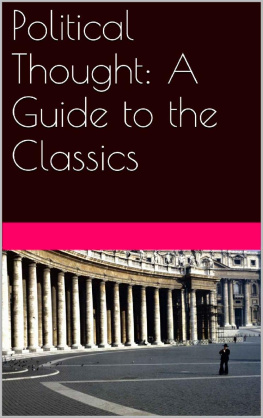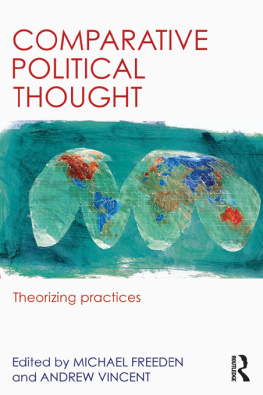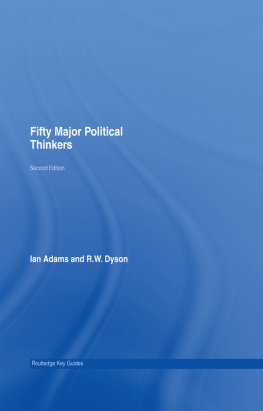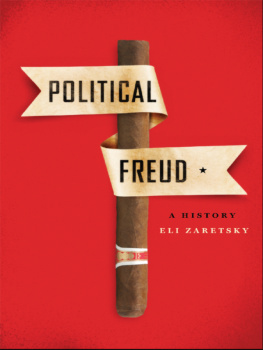FOREWORD
This is an old-fashioned history of political thought. It gives an account of great texts. These texts are chosen either because they are great in themselves or because they have influenced other texts or the world. I have no particular story-line. I did try to keep one going, but it refused to work except intermittently. I began to try to write a history of political thought from the bottom up, so to speak, concentrating on the ruled as well as upon rulers. It has always struck me that there has never been enough attention paid to the nature of the peoplesometimes the crowd, sometimes the mobwho are to be ruled. A particular thinkers view of the raw material of government is bound to affect what that thinker thinks rule can and should be like. However, I found that line of approach difficult to sustain, because the views of particular thinkers about the human raw material of political communities are often so deeply buried in their texts that those texts would have to be put on the rack to yield up their secrets. And, as everybody knows, secrets revealed on the rack are notoriously unreliable.
This book is the product of many years as a teacher of what used to be called political theory, and I have many debts. Richard King, Dennis Kavanagh and David Regan kindly read chapters and offered good advice. Robert Markus was, as ever, the soul of generosity, and the range of Peter Morriss wit and wisdom is a constant surprise and delight to me. Mrs April Gibbon displayed her usual intelligence and patience with the typescript. I would like to thank two of my former students. Mr Lee Steptoe invented in a seminar the idea of a bourgeois tank, and this made me wonder whether there are any genuinely socialist means towards socialist ends, and Ms Elizabeth Walters turned my flank in a tutorial by showing that a rather complex argument of mine (and one of which I was rather proud) about the Guardians in Platos Republic was completely unnecessary.
Finally, I would like to acknowledge the debt I owe to Tom Paulin. This book would never have been written if he had not encouraged and consoled me on Monday evenings over several years.
John McClelland, Nottingham
Part I: The Greeks
ANCIENT GREEK POLITICAL THOUGHT
THE CONTEXT
The ancient Greeks are said to have invented political theorising, but the sense in which they invented it is frequently misunderstood. Systematic reflection about politics certainly did not begin with Plato, and Plato himself certainly did not wake up one day, find that he had nothing much on his hands, and begin to write the Republic. Equally, it appears to be the case that politics were not the first thing that the ancients reflected systematically about; nor was it the case that when they did begin to think about politics they had nothing else in their heads. Speculation about the gods, about how a properly conducted household should be run, about what moral instruction the Homeric poems contained, about the nature of the natural world, about the duties and limits of hospitality, and about many other things was already far advanced before anything like political theorising began. That list of things could no doubt be extended almost indefinitely, and perhaps we should extend it, even if we would have to extend it by guesswork, because what we do in fact know about what the ancients did think about is largely the result of the accidents of the historical survival of manuscripts, and it is perfectly possible that what has come down to us is a distorting fragment which gives us a very misleading picture of what was going on inside the heads of ancient Greeks. And which ancient Greeks? Some ancient Greeks were very ancient indeed (the Homeric poems were probably already being recited around 800 BC), and some lived very far from the borders of the modern state of Greece, in southern France and Italy, for instance, or in Asia Minor, or Egypt. Those calling themselves Greeks did not even agree about what it was that made them Greek. The Greek world had its great centres: Delphi for its oracle; Olympia and Corinth for their games; Athens for its wealth, its empire and its learning; and Sparta for the longevity of its peculiar institutions, but myriads of people thinking of themselves as Greek had never been near any of those places, though they would have heard of them and might have felt their influence. Nobody knows now what all of these people thought, just as nobody did then.
If the business of trying to empty a typical Greek mind of its contents is a fruitless exercise, we can still ask the important question of how the mind was organised. The list of things which the Greeks had thought about before they began to think systematically about politics gives us a clue to how their minds worked. That list could be extended but we would have no reason for ordering it in any particular way. The ancients were pragmatic; they always asked: How? before they asked: Why?, and in the pre-classical period they do not appear to have distinguished between different kinds of how? -questions. How a stranger should be treated, how a sacrifice to the gods should be
conducted, how war should be waged, or how the work of a farm should be organised did not seem to them to be different kinds of questions. We are so accustomed to thinking that questions which involve morality are different from technical questions about the best way to do things, that it is very easy to slip into the error of supposing that the ancient Greeks must have been very simple folk because they could not see the difference. There can be little doubt that they did not see the difference, or if they did, the difference did not seem very remarkable to them, but the reason they did not was far from simple. The pragmatism of the ancients originally stemmed from so close a connection between thought and action that thinking about anything was thinking about the proper or the best way of doing it. It is almost as if they thought that thinking without a view to action was not worth the trouble, and no ancient Greek thinker ever thought that in some sense thinking was worth it for thinkings sake any more than any Greek artist did art for arts sake. Questions about how to do something always implicitly contained the question: How ought we to do something?, and the question: How ought we to do something? always contained the implicit assumption that anything which was worth doing was worth doing well.
Thinking about how things can be done well, how they ought to be done, has to start somewhere, and the ancients were fortunate to have at their disposal the Homeric poems, the Iliad and the Odyssey, which, if properly read, could answer almost any conceivable question about how a man should act towards his fellow men and towards the gods. The poems also contain a good deal about how the gods act towards men. The anger of the gods with men, or with each other, frequently results in what we would call natural disasters, plagues, thunderstorms, storms or contrary winds at sea, for Zeus rules the land and Poseidon the ocean, so that the Homeric poems contain a good deal about how the natural world works as well. These three worlds, the world of nature, the world of men and the world of the gods, exist in the poems in very close harmony, so that it would not be stretching the term system too far to say that there is a Homeric system which explains and justifies almost everything that goes on in the world and which answers almost any questions that someone living in the world would care to ask. It was this Homeric world-picture which in classical times was becoming less and less satisfactory as a universal explanation of what went on in the world, at least to philosophers, but it was also a world-picture which never lost its appeal entirely as the source of a code of conduct, and some classical philosophy can best be understood as an attempt to resurrect the certainties of the Homeric world on the basis of rational argument, so that these certainties could still retain the loyalty of rational men. In particular, what attracted political philosophers to the enterprise of restating Homeric truths was the sense of order and symmetry which pervades the poems, an order which was never complete but which seemed to survive all the vicissitudes to which it was subjected. A world which was always threatened by disorder but out of which order always eventually came was bound to be attractive to political thinkers as a mirror and image of their own world of politics, where the alternation of order and disorder could easily lead to a sense of despair unless an order could be discerned prior to and beyond the everyday messiness of the affairs of cities.

